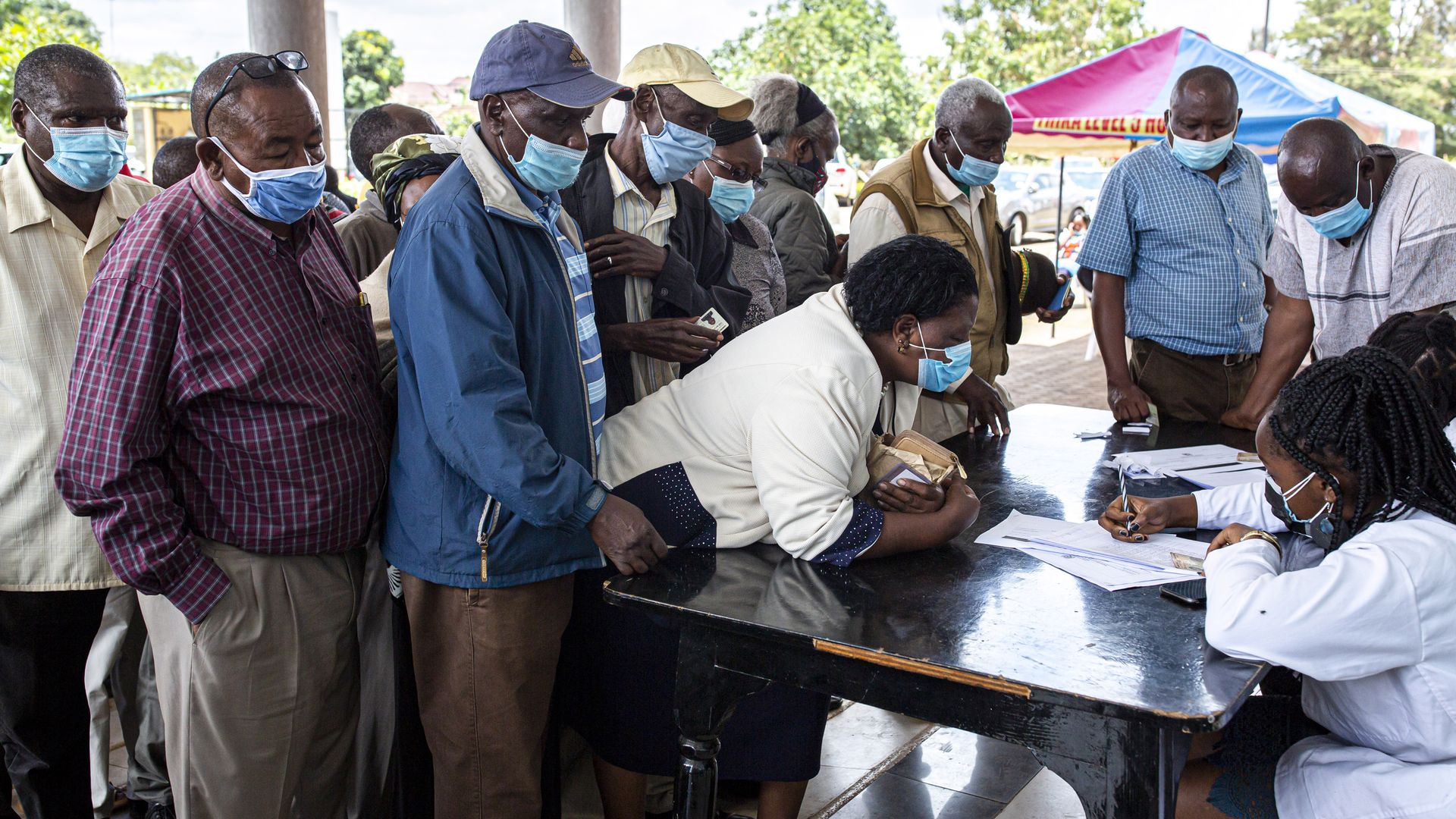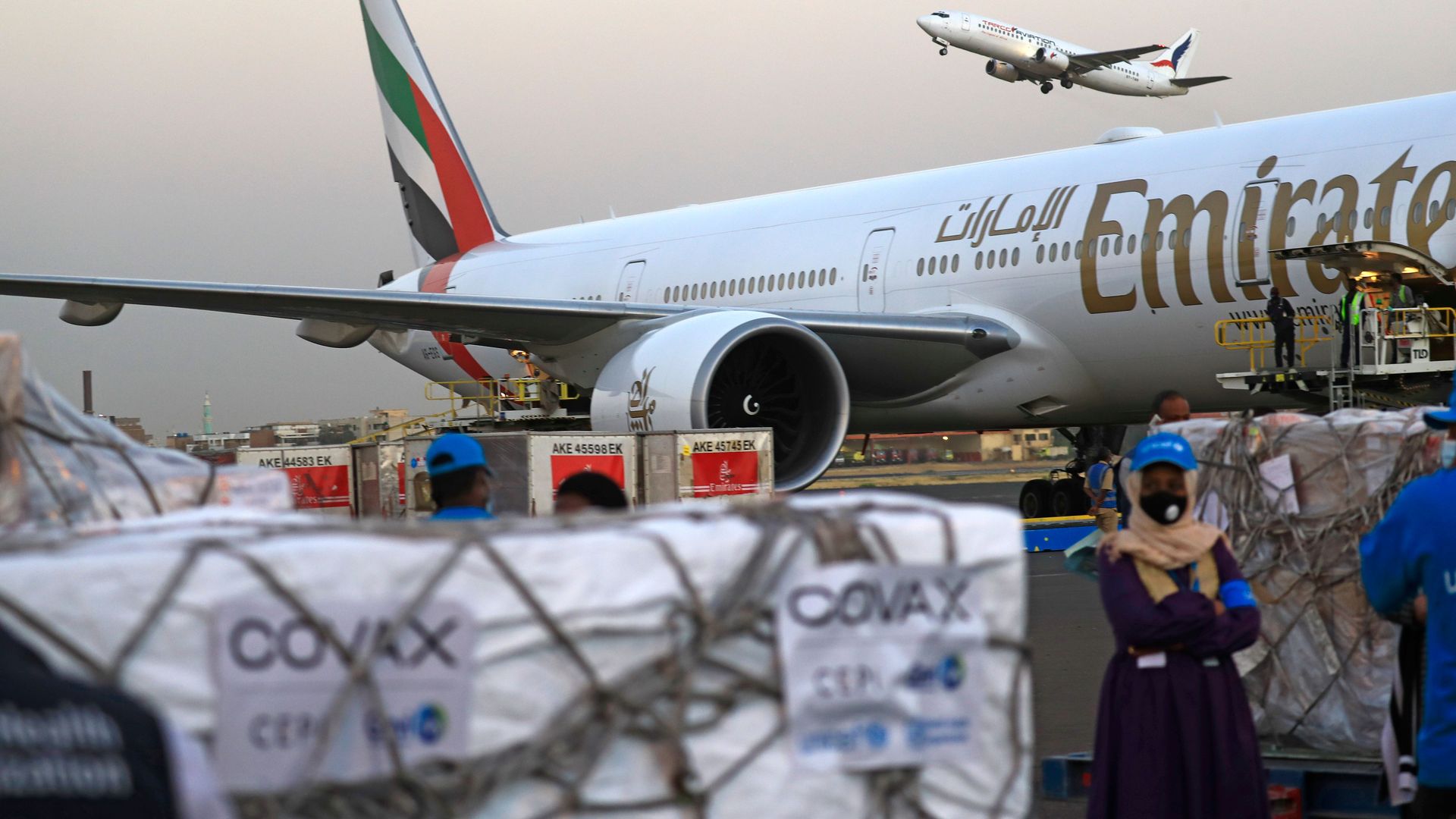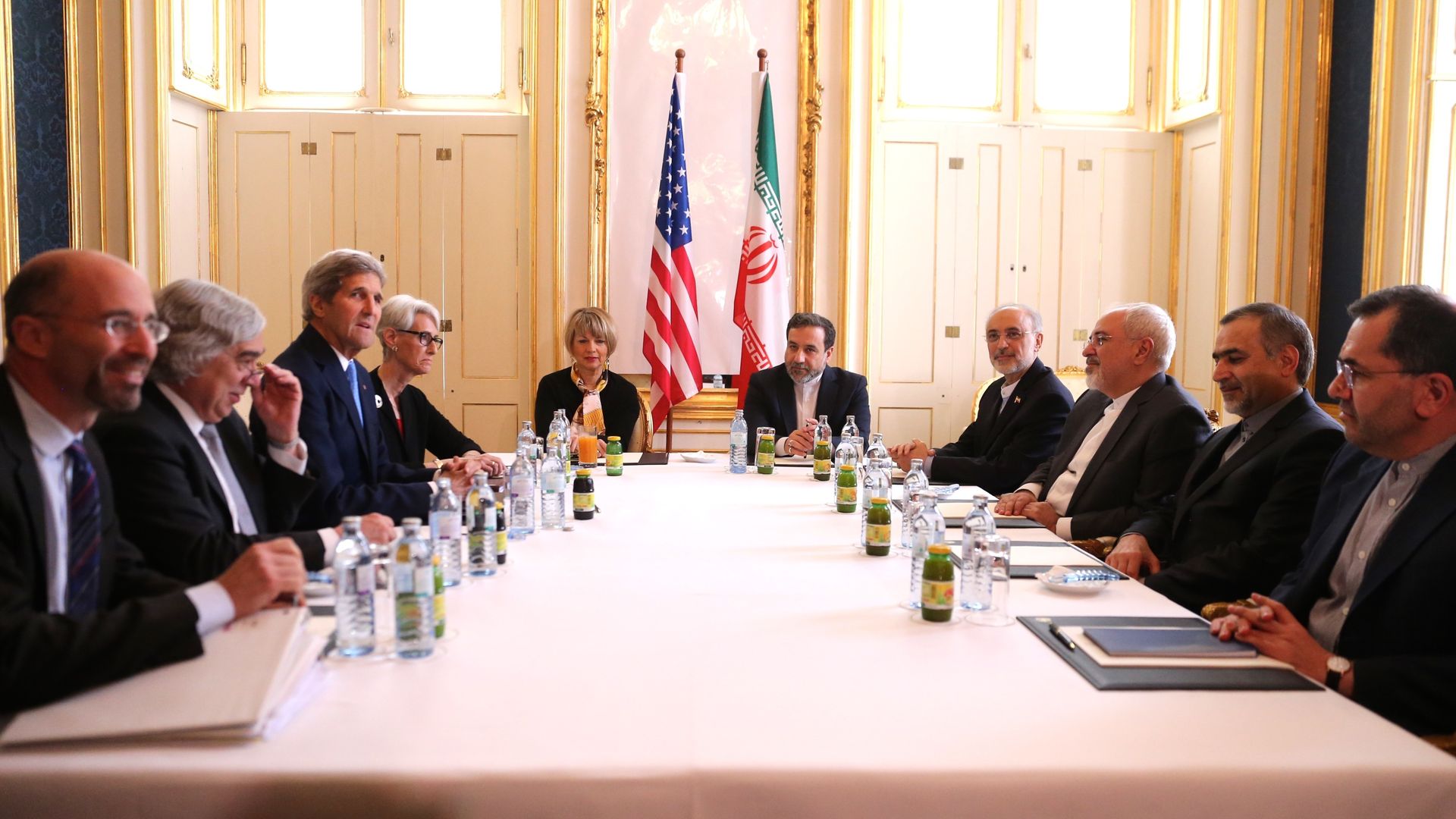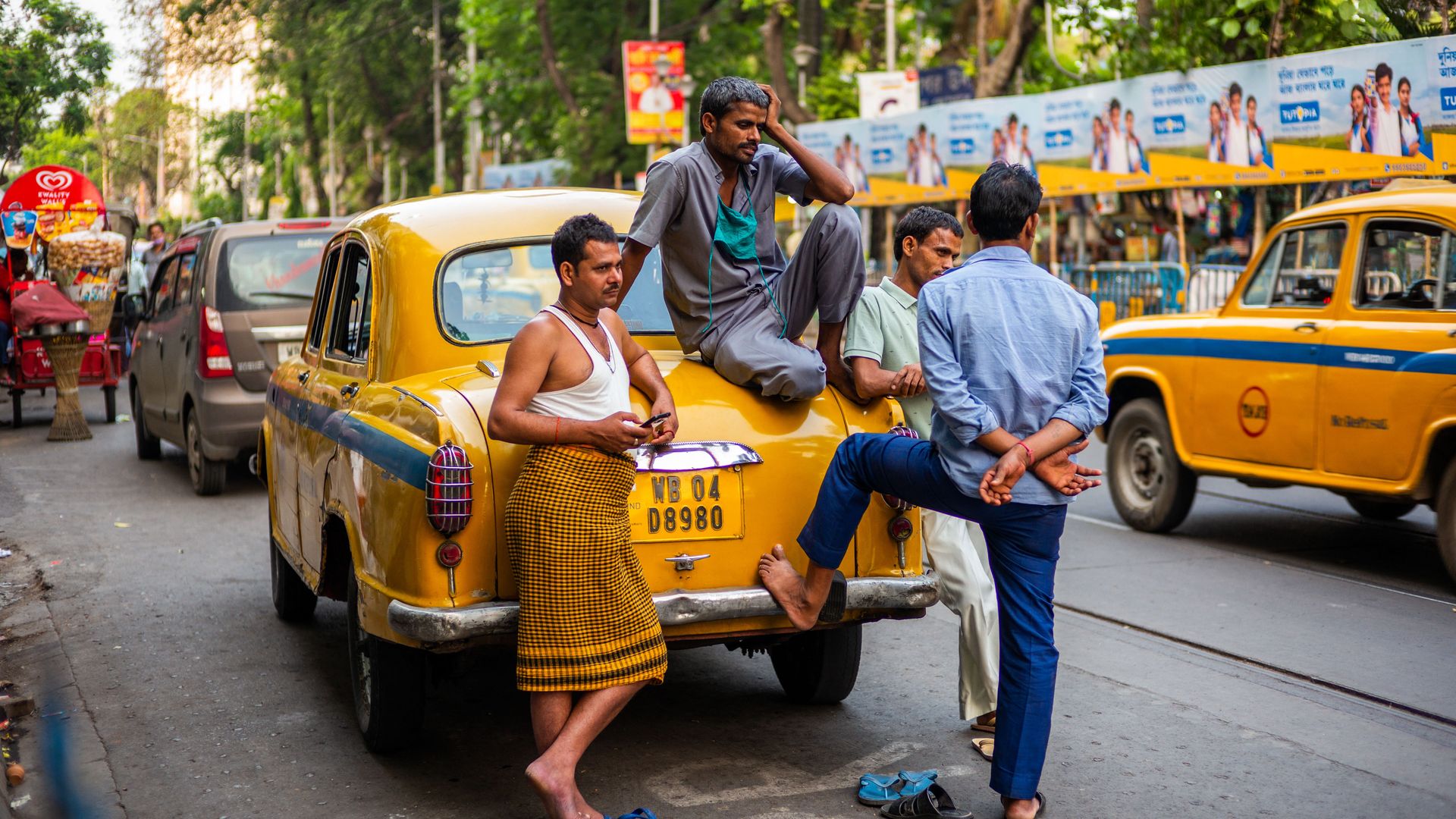| | | | | | | | | | | Axios World | | By Dave Lawler ·Apr 05, 2021 | | Welcome back to Axios World. - We're diving deep tonight on the race to ramp up vaccinations in Africa, with stops in Jordan and Vienna (1,416 words, 5 minutes).
- Thanks for being a reader. Please tell a friend to sign up.
Situational awareness: Gayle Smith has been named as the Biden administration's coordinator for the global pandemic response. She was previously CEO of the One Campaign and a key player in the Ebola response under Barack Obama. | | | | | | 1 big thing: The struggle to vaccinate Africa |  | | | Registering for a vaccine, in Thika, Kenya. Photo: Patrick Meinhardt/Bloomberg via Getty | | | | The first shipment of long-awaited coronavirus vaccines finally arrived in the Democratic Republic of the Congo on March 3. One month later, they're still sitting in a warehouse in the capital, Kinshasa. Why it matters: Africa is at the back of the global line for vaccines, and most countries only expect enough doses to cover a fraction of their populations this year. But in some cases, even those limited supplies may not be fully deployed before they expire. Zoom in: The DRC has received 1.7 million Oxford/AstraZeneca doses from the global COVAX initiative. The government delayed the rollout, citing health concerns stemming from the AstraZeneca rollout in Europe. But the challenges don't end there. - Health workers in the provinces haven't yet been trained to administer the vaccine due to funding shortfalls, says Freddy Nkosi, DRC country director at VillageReach, which is advising African governments on vaccine distribution.
- A digital data collection system designed to guide the vaccination campaign is also not yet operational, Nkosi adds.
- Once the rollout begins, it will be difficult to transport doses even to nearby provinces because of poor roads, he says. Other provinces in the giant country of 86 million people will only be reachable from the air.
Assuming the shots do arrive at distribution centers and health workers are prepared to administer them, there may not be much demand. - "There are so many rumors circulating around the vaccines, and that's also contributing to so many people, even among the health workers, being very hesitant to receive the vaccine," Nkosi says.
- VillageReach is involved in a public engagement campaign to inform people about the vaccines and their eligibility for them.
- But the DRC is on the clock. Those 1.7 million doses will expire in three months, Nkosi says. If large quantities go unused, that will not only set back the first wave of vaccinations, it will undercut appeals for further shipments.
Zoom out: The DRC isn't alone. In Ivory Coast, where a slow rollout could cause thousands of shots to expire, health officials are blaming "a kind of systematic refusal of the vaccine," per the Washington Post. - While Rwanda has distributed nearly all of the vaccines it received last month and Ghana isn't far behind, most African countries that received vaccines through COVAX are moving very slowly (or, like the DRC, not at all).
- The ticking clock and the distribution challenges could further exacerbate inequity if governments elect to prioritize capital cities like Kinshasa, or allow the well connected to cut in line.
- In Kenya, as all over the world, wealthy people seem to be having a far easier time getting access. The government is now moving to shut down a secondary market in which private clinics are selling the Sputnik V vaccine for around $80 per shot, AP reports.
|     | | | | | | Part II: The funding gap |  Note: This map represents the total number of vaccines administered, not people vaccinated; Data: Our World in Data; Map: Danielle Alberti/Axios Countries had to submit distribution plans to receive doses through COVAX, but funding to help implement those plans has been slow to arrive. Breaking it down: CARE, the global anti-poverty charity, estimates that for every $1 invested in procuring the shots themselves, $5 will have to be invested in distribution — much of it to pay, equip and train health care workers. - Other major costs include improving health infrastructure like cold chains and conducting public outreach to people who would likely have to travel long distances to get a vaccine they might not trust.
- But while COVAX has received most of the $11.1 billion it sought to procure vaccines for lower-income countries, rich countries have donated just $565 million of the $9 billion required to prepare health systems, says CARE's Emily Janoch.
- "Resources follow the attention," she says, "but the goal isn't to have vials of vaccines, it's to have vaccinated people."
What to watch: The World Bank is now ramping up funding for distribution, and the Biden administration may soon get involved as well. |     | | | | | | Part III: The greatest supply chain challenge ever |  | | | Precious cargo arrives in Khartoum, Sudan. Photo: Ahsraf Shazly/AFP via Getty | | | | Even with sufficient funding and vaccine supply, this might still be the greatest supply chain challenge ever, says Ron Cruse, CEO of Logenix International. His company moves medical supplies around Africa and is preparing to transport coronavirus vaccines as well once the U.S. starts exporting. Cruse says the challenges are clear just by looking at sub-Saharan Africa's two most populous countries, Nigeria and Ethiopia. - "We have trouble running malaria nets around Nigeria. Any trucks that go from Lagos to Abuja have to be guarded," he says, including to ensure that authorities don't seize supplies for local use.
- Meanwhile, Ethiopia is a "tinderbox," Cruse says, noting that millions of people live in conflict areas in the north and west of the country.
- Around the continent, the challenges will also include government corruption and a looming rainy season that could make some roads impassable for weeks at a time.
What to watch: Cruse thinks it simply won't be possible to deploy the Pfizer/BioNTech or Moderna vaccines at scale in Africa, as they require ultra-cold temperatures. - The COVAX rollout to date has been based almost entirely on AstraZeneca, but that vaccine is facing challenges of both supply and demand.
- Johnson & Johnson's single-shot vaccine is a promising alternative, but supply is just now ramping up. That leaves a big role for vaccines from Russia and China.
What to watch: Supply to Africa should increase significantly in the second half of this year, particularly as the U.S. starts exporting and manufacturing ramps up in South Africa. - But once vaccines arrive on the continent, the distribution struggle begins.
|     | | | | | | A message from Axios | | Keep tabs on the stories impacting the Latino community | | |  | | | | Get smarter, faster on the most consequential news and key issues impacting the Latino community on both sides of the border. A collaboration between Axios and Noticias Telemundo, delivered weekly to your inbox. Subscribe for free | | | | | | 4. Global news roundup: A troubled kingdom |  | | | Prince Hamzah in 2009. Photo: Attila Kisbendek/AFP via Getty | | | | 1. Former Jordanian Crown Prince Hamzah bin Hussein, who was put under house arrest on Saturday and accused of trying to destabilize the country, signed a letter on Monday pledging allegiance to his half-brother, King Abdullah II. - Why it matters: For now, the letter seems to have resolved a crisis inside the royal family that began on Saturday with a string of arrests and allegations of a coup plot.
- After being put under house arrest, Prince Hamzah had accused the government of decades of mismanagement and corruption, though he denied having conspired in any coup plot.
- This story has had several twists and turns, including the involvement of an alleged Israeli spy.
2. Vladimir Putin has signed a law that would let him seek additional presidential terms in 2024 and 2030. - Why it matters: Putin was running up against term limits until proposed constitutional changes were approved via referendum last year. Now he could potentially remain in power until 2036, when he'll be 83.
3. Bulgaria's ruling party won the most seats in Sunday's election but saw its support fall significantly from 2017, leaving Prime Minister Boyko Borissov with the difficult task of trying to cobble together a new coalition. - The big picture: This election was seen as a referendum on Borissov, following massive anti-corruption protests last year. It was far from a resounding victory.
4. Vietnam's legislature named Pham Minh Chinh prime minister today, replacing Nguyen Xuan Phuc, who will take on the largely ceremonial role of president. 5. At least 22 Indian soldiers were killed and another 31 injured in a battle with Maoist insurgents on Sunday, per CNN. |     | | | | | | 5. Israel's split screen: Netanyahu on trial as post-election talks begin |  | | | Netanyahu arrives in court on Monday. Photo: Oren Ben Hakoon/Pool/Anadolu Agency via Getty | | | | As the first witness in Israeli Prime Minister Benjamin Netanyahu's corruption trial took the stand on Monday, President Reuven Rivlin was consulting with representatives of Israel's political parties as to who should form the next government. Why it matters: This split-screen moment between the Jerusalem district court and the president's residence encapsulated the political and legal crisis that has engulfed Israel over the last two years, Axios' Barak Ravid reports. Driving the news: Netanyahu was on hand this morning to listen to the opening statement of the lead prosecutor in his case, Liat Ben-Ari. - She said the main charge against Netanyahu is that he abused his power as prime minister to receive personal and political benefits from media tycoons.
- After the court session ended, Netanyahu attacked the prosecutor in a statement, claiming the charges were fabricated and he was the victim of a politically motivated "witch hunt" and "an attempted coup to topple a right-wing Prime Minister."
- What's next: By Wednesday, Rivlin is expected to hand either Netanyahu or opposition Yair Lapid a mandate to form a government. It will all play out with Netanyahu standing trial three days a week.
Go deeper |     | | | | | | 6. Coming attractions: Nuclear diplomacy in Vienna |  | | | The U.S. and Iranian delegations during the 2015 talks in Vienna. Photo: Siamek Ebrahimi/Anadolu Agency/Getty | | | | U.S. and Iranian officials will take part in nuclear talks tomorrow in Vienna… from separate rooms. - At least that's the plan for now. With Iran refusing to meet directly with the U.S., European diplomats are expected to shuttle between meetings with the two sides.
- It's both a step forward for nuclear diplomacy and a sign that the path back to the 2015 nuclear deal appears much longer than many had anticipated.
- The state of play: To salvage the deal, the U.S. will have to remove sanctions and Iran will have to unwind its recent nuclear acceleration. The questions on the table in Vienna are how those things will happen, and when.
|     | | | | | | 7. Stories we're watching |  | | | Cabbies in Kolkata, India. Photo: Jewel Samad/AFP via Getty | | | - COVID-19 latest: India's surge continues, Bangladesh locks down, England opening, U.S. travel spikes
- Ukraine-Russia tensions: Biden calls Zelensky, NATO plans exercises
- Biden revokes Trump's sanctions on International Criminal Court
- At least 50 killed after train derails in Taiwan
- Deadly flash floods in Indonesia
- Central bank balance sheets surge
- In photos: Egypt's grand mummy procession
Quoted: "I'm in the guest house, like a crazy man ... not even the dogs visit me." — President Alberto Fernández of Argentina, who is self-isolating after testing positive for COVID-19 despite having received the Sputnik V vaccine. His case is mild, and the vaccine's manufacturers say it will prevent serious illness. |     | | | | | | A message from Axios | | Keep tabs on the stories impacting the Latino community | | |  | | | | Get smarter, faster on the most consequential news and key issues impacting the Latino community on both sides of the border. A collaboration between Axios and Noticias Telemundo, delivered weekly to your inbox. Subscribe for free | | | | | | Axios thanks our partners for supporting our newsletters.
Sponsorship has no influence on editorial content. Axios, 3100 Clarendon Blvd, Suite 1300, Arlington VA 22201 | | | You received this email because you signed up for newsletters from Axios.
Change your preferences or unsubscribe here. | | | Was this email forwarded to you?
Sign up now to get Axios in your inbox. | | | | Follow Axios on social media:    | | | | | |










No comments:
Post a Comment